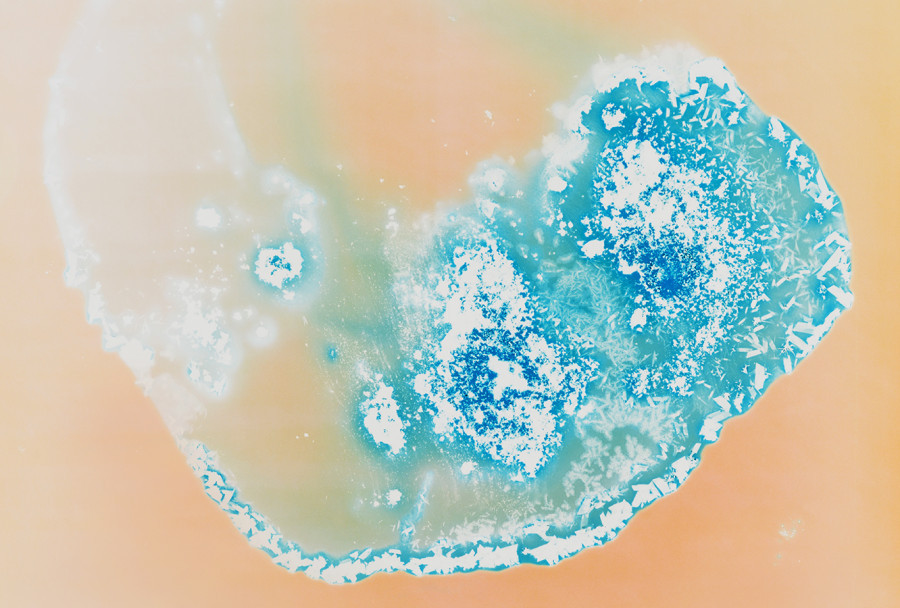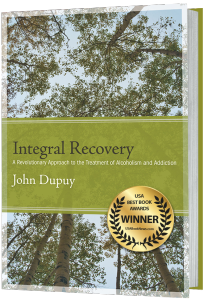
The chemical reaction of a drop of heroin on film. Photo by Berlin-based artist Sara Shonfeld. See more.
Every once in a while a celebrity death brings the issue of addiction to the forefront of our collective consciousness. Phillip Seymour Hoffman’s passing was terrifying for many addicts because unlike say, Amy Winehouse, who was never sober long enough to be in recovery, Hoffman had twenty-three years clean. After relapsing on painkillers in 2012 he was apparently in and out of rehab a few times, but he never recovered again.
In general, professionals in the field still have an uphill battle when convincing the larger public that addiction is a disease. People see hard drinkers quit when too many negative consequences pile up, or they themselves have experienced withdrawal from a medication or had to kick a habit, so they think that all you need is enough willpower. But if you are the type that can walk away when the consequences get bad enough, then you are not technically suffering from the disease of addiction.
A habit that’s got you in a headlock can be painful, but it’s ultimately a different phenomenon than the chokehold of addiction which is, 99 times out of a hundred, inherited genetically.
And while genes play a big role, they are only a part of the picture. Your environment, your upbringing and your individual psychology are all factors. It’s a bio-psycho-social disease which is the reason it has to be treated on all those levels, and why an integral approach could be revolutionary.
Science has shown us that this is a brain disease, beyond any doubt…none of this ‘I have an addictive personality’ or ‘I’m just a bad person’. I mean you might be a bad person but that’s not why you’re an addict.-John Dupuy
It does appear to be a spectrum with many shades of grey, though. I’ve had my own struggles and I fall somewhere on that spectrum. Maybe you do too. It’s hard to find a person or a family that isn’t affected.
But we can all learn from the people who are working on the front lines of it like my friend and mentor, John Dupuy. John had been working in the field of recovery for many years when he discovered Ken Wilber’s work, and got massively excited when he realized that this could be a map for a more comprehensive approach to the treatment of addiction (and depression and PTSD, among other things).

Available from Amazon, Google or Suny Press directly
John is a living example of an integral life practice. He’s right there on the ground with his students and clients — meditating, weight training, learning new things all the time and doing shadow work to face down the demons. “If you’re not practicing, you’re relapsing,” he writes in Integral Recovery.
The huge strides in brain science have revealed some profound truths to us in recent decades, but the disease itself is still complex and mysterious. The people that I know that have successfully recovered from it have done so using a power greater than themselves. Some of them call it God, some call it love, or sangha, or emergence itself, but it always involves a certain trust, a surrender that looks to me suspiciously like an integral consciousness. Because there comes a time when an addict has to let addiction solve him. And consequently he is irrevocably changed by it.
It’s not about gaining control, ironically. It’s about letting go and trusting that you are in good hands. It’s learning how to be okay with not being in control.
To do what he does, John seems to become a cross between a football coach and a rabbi, a Zen master and a college professor. I hope you find this conversation between him and Jeff as interesting and inspiring as I did! And if you get a chance, check out John’s book.
-Brett Walker
Need some help to listen on your mobile device? Click here.
Podcast: Download
Subscribe: Google Podcasts | RSS






I have been clean and sober 15+ years with a masters in social work, I received that in my second year of recovery. I studied psychology intesily for the first 10 years of my recovery for myself and profession until I discovered Ken W. Which prompted me to go back and forward, reading William James, Kant, Sweedenbergh… I also enjoyed holosync but to my resignation from a job that punished me for doing what’s right, I’ve been unable to continue with it. That was for some back ground but Bruce Lipton rights very clearly, how nothing is genetic, I would encourage the authors and all listening to read his books, they go extremely well with Ken W. The Best part of this interview for me is that from the beginning of my recovery, I have added aspects in my first year such as my sponsor giving me Zen books such as A Passioate Mind (Joel Kramer) which at the time was extremely difficult to read, at the end of my first year as I began my second, weight lifting/bodybuilding became an important part of my life. Healthy eating has always been apart of my life but as mentioned all these things have been growing in my life. It’s amazing, and not knowing that while the authors have been doing these things so have I without knowing of each other’s endeavors. Carl Jung spoke of this mental connection clearly in his las book Symbols as does Ken W. both are saying everything known “I” also know because I am God – God is me and God knows all therefore I also know, the problem is I don’t know what I know and it is my duty while alive to reveal to myself everything I already know and incorporate it into my life for myself and those around me to see what they too already know. I would love to join you guys and bring this realization to the east coast where I live. I do as much as I can but without resources or backing it is extremely difficult to even plant the seeds. Though I continue to improve all the aspects in my own life and work through AA to help others though as John mentioned it is hard to find those awake enough too look at what’s being revealed some are just incapable of being honest due to the pain of dealing with their past and it’s repercussions for the immediate future in their recovery. The other aspect I find difficult is finding people who are fluent with the quadrents and any of the aspects I’ve mentioned my main source of connection to people as aware as me is these e-mails and podcasts and with these I can only listen because I have no money to actually interact. There must be others like me in my area to join with and focus our mental energy and heal our immediate area through meditation and good intentioned thought. It felt good to babble on here, hope it made sense… Thanks
This may not be the best place to ask this, but, I need a drug rehab and I can’t find one nearest me… has anyone heard of this addiction treatment center? It’s address is in Los Angeles, not too far from my residence I can’t find comments or reviews on them — Los Angeles Drug Rehab, 601 S Figueroa St #4050, Los Angeles, CA 90017 – (213) 634-4424
Dear Emile,
SAMHSA offers an online treatment locator service that can be accessed at http://www.samhsa.gov/treatment/ or by calling 1-800-662-HELP (4357)
Alcoholics Anonymous http://www.aa.org/?Media=PlayFlash can help you find meetings in your area, and people at those meetings will know what your options are.
You’re smart to ask for help and I wish you the best. -brett